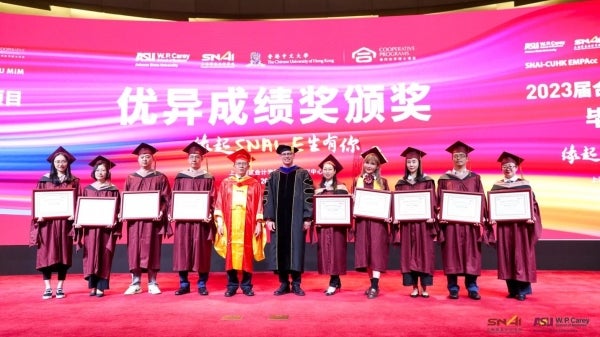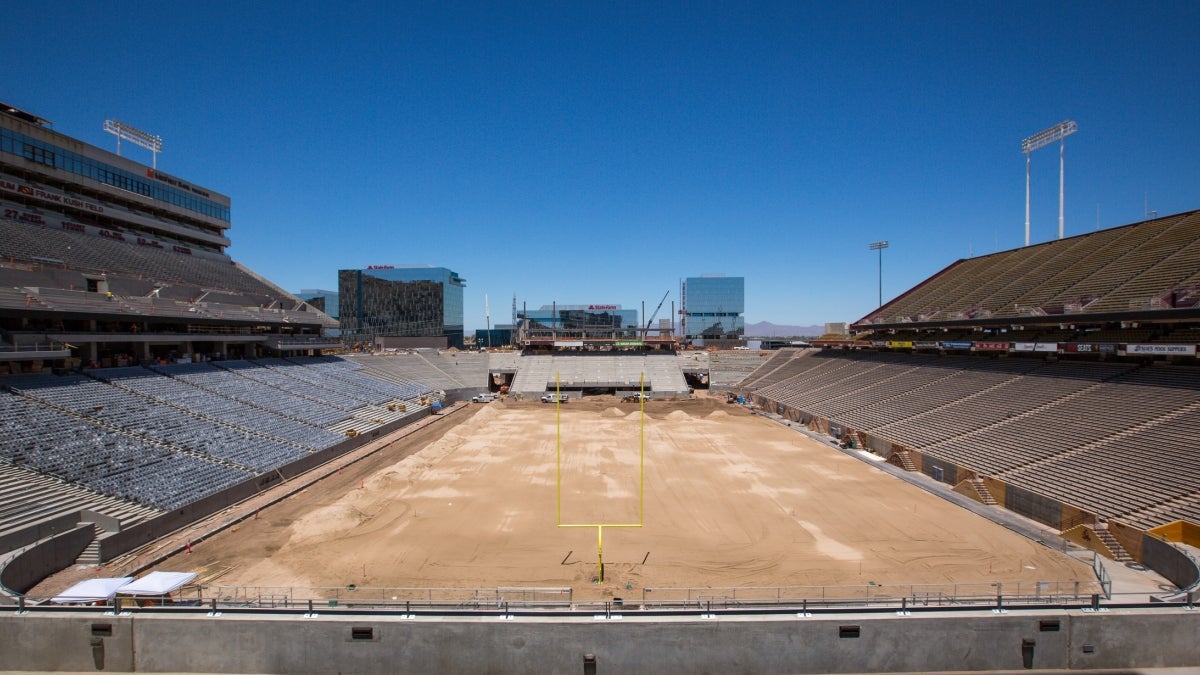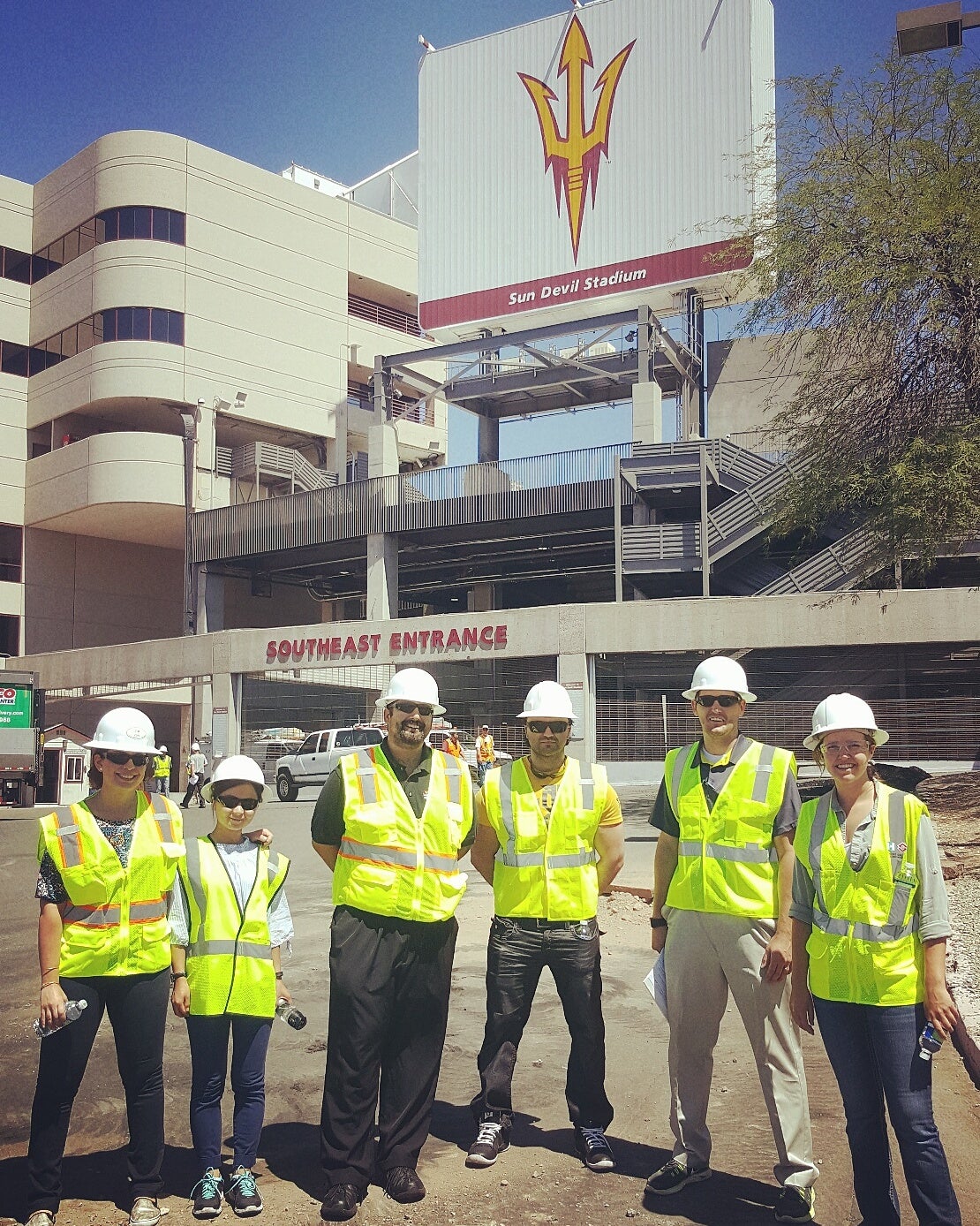Editor's note: This story is being highlighted in ASU Now's year in review. To read more top stories from 2016, click here.
For about seven Saturdays every fall, Sun Devil Stadium is a paradise of Arizona State University spirit as thousands of screaming fans cheer on the football team, but on any given weekday it sits quiet and practically vacant.
ASU wants to change that and hopes to create a year-round cultural hub that draws people of all ages every day of the year after the stadium's $250 million renovation is complete next year.
A team of five graduate students took on the challenge, called Stadium 365, in a consulting internship this summer. The group, which recently gave its final presentation, envisions Sun Devil Stadium filled with fitness classes, alumni gatherings, conferences, dinner parties, academic classes, running events, concerts, pop-up stores and a weekly farmers’ market.
Right now their proposals are just ideas, but ASU has made clear that it is serious about transforming the stadium's role in the community.
“The potential of what this project could be is unbelievable because no one has done what we’re trying to do — 100 percent utilization 365 days a year,” said A.J. Higgins, one of the team members, who earned an MBA in May from at the W. P. Carey School of Business.
The proposals could earn revenue for ASU and promote the university's brand in the community while deepening its ties with students, who would be running many of the events.
'It's important to get this right'
ASU held an open house last fall to gather stadium ideas from community members, who came up with everything from Rolling Stones concerts to yoga classes.
The MBA students spent 10 weeks calling other venues, talking to alumni, analyzing costs and revenue projections and weighing variables in order to support their proposals.
Some of the pitches would generate a lot of money, but be complicated to implement. For example, a big-name concert could potentially, according to the students' proposal, earn more than $2 million in one day in ticket, food and beverage profits, but it would require costly security and clean-up.
ASU wants a lot of people to use the new stadium, so free or low-cost events that wouldn’t make much profit still would be desirable. For example, the graduate students estimated that free movie nights might earn only $60,000 a year from food and beverage sales but could draw a non-football-fan crowd and fill a need for family-friendly entertainment. Likewise, fitness classes could generate $52,000 annually, but they also would utilize the stadium for more than 200 days a year. Those kinds of uses would strengthen ASU's community connections.
One idea that would make money from currently unused space is pop-up stores — tents set up on the stadium concourse. The student team estimated that ASU could make about $144,000 a year leasing these spaces. More importantly, the pop-ups could be low-cost sales venues for student or community entrepreneurs.
The students had to figure in variables such as competition. For example, stadiums at other universities make money by hosting high school sports tournaments. ASU could potentially host high school soccer or football events, but the University of Phoenix Stadium has a profit-sharing agreement with area high schools for playoff games and NCAA rules prohibit ASU from that kind of a deal.
Most of the ideas focused on using the field and concourse, but the student team saw big potential in leasing the club and suite spaces — estimating earnings $2 million a year and drawing more than 760,000 people. These spaces would be attractive for meetings and conferences, with views of the field. However, suite owners might not go for it.
Food and beverage sales are the crux of the plans, and the group spent a lot of time researching possibilities.
“From a fan perspective, it’s important to get this right, but it’s also important to get food and beverage right form a business perspective,” said Moose Fritz, one of the team members.
“Every year, fans spend more than $1 million on concessions at Sun Devil Stadium, and the university gets almost $400,000 just from concessions from the main part of the stadium,” he said.
The Stadium 365 student team toured the stadium earlier this month while analyzing proposals to use the venue year-round. Contributed photo
ASU could make a lot more money by eliminating the third-party vendor it hired to run all the stadium’s concessions, according to the group. (It's important to remember that this is just a proposal in the student project — there is no indication from the university that this is under consideration.)
If the university were to take over running the food and beverages itself, the profit could be $4 million according to the estimate.
Fritz said that few universities do this because it’s complicated and might require a lot of money to be spent on renovating the kitchens and concession stands.
One important element to keeping the stadium student-centric is allowing students to spend their “Maroon and Gold Dollars” — their pre-paid food-service accounts.
“We estimate $2.50 per capita on food and beverage but that will go to zero if they can’t pay us,” Fritz said.
Giving back to ASU
The students said they had almost no limitations when they began their project — except they couldn't use the field during football season.
“I think that speaks to the innovative nature of ASU that there was no solution that was off the table from the start. If we can show it will work, they’re willing to listen and give it some consideration,” Fritz said.
They faced questions about whether their plans would really be implemented. The students are optimistic, and Colleen Jennings-RoggensackJennings-Roggensack also is associate vice president for cultural affairs for ASU., executive director for ASU Gammage who is overseeing all programming at the new stadium, told them that they should give their presentation to the university’s top administrators.
“The level of detail that you’ve gotten will be a great guide for us,” she said.
Team members Ying Zhang and Lida Amini Shervin are international students who have never been to a football game. When they think about the stadium space, they hope for cultural events that draw families and young professionals.
Fritz said he saw the internship as a chance to give back to ASU.
“I came back to school because I wanted a management position in the Foreign Service. So if I’m going to be a public servant the rest of my life, I’m probably not going to make enough money to donate enough to get them to name a building after me. But this gives me the opportunity to have a lasting effect on the university,” he said.
Todd Runyan, another team member, said that working on a stadium was special to him because he was a college football player at Brigham Young and Cornell universities.
“This could be a great place to for students to get real-world experience running a stadium. That would add to their ASU degrees that they actually did this at a major venue,” he said.
“As a football player it was a special place for me," he said. "But if we could make it special for everyone, that would be a success in my eyes.”
More stadium ideas
ASU Design School students drew on faculty research and their peers’ creativity to rethink the idea of what a stadium can — and should — be. Read their ideas here.
Top photo: Sun Devil Stadium is undergoing a $250 million renovation. Photo by Charlie Leight/ASU Now
More Business and entrepreneurship

New ASU certificate to address veteran underemployment
Veterans and military spouses bring a wealth of talent to the corporate world. Unfortunately, human resources and hiring managers without military backgrounds often struggle to understand…

ASU China Executive MBA ranked No. 7 in world by Financial Times
In the 2024 Financial Times rankings for Executive MBA (EMBA) programs, Arizona State University's W. P. Carey School of Business China Executive MBA program ranked No. 7 in the world, ahead of the…

ASU, Ghana partnership enhances supply chain practices in Africa
As a New American University, ASU defines the communities it serves as including both its backyard neighbors and colleagues around the world. For the past four years, Arizona State University…

